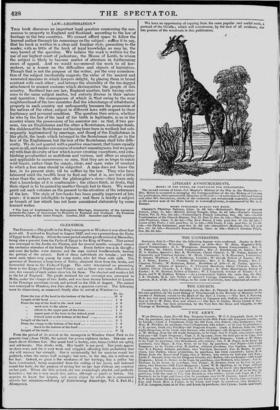LAW-LEGITIMATION.'
THIS book discusses an important legal question concerning the succession to property in England • and Scotland, according to the law of heritage in the two countries. We cannot afford space to follow the learned author through his reasonings on the subject : suffice it to say, that his book is written in a clear and familiar style, presenting to the reader, with as little of the husk of legal knowledge as may be, the very kernel of the question. We believe the work is written for the use of our highest court of judicature, the House of Lords, to whom the subject is likely to become matter of attention in forthcoming cases of appeal. And we would recommend the work to all lawmakers, as a lesson on the difficulties and objects of legislation. Though that is not the purpose of the writer, yet the very consideration of the subject incidentally suggests the value of the ancient and Venerated maxims in which lawyers delight, by placing. them in broad contrast with each other; and betrays the absurdity of the too dogged attachment to ancient customs which distinguishes the people of this country. Scotland has one law, England. another, both having reference to the same subject matter, but entirely diverse in their nature and Operation : the consequence of which is, •hat owing to the near neighbourhood of the two countries dnd the interchange of inhabitants, property in each country not unfrequently becomes the possession of the natives of the other, subject to different laws with respect to their legitimacy and personal condition. The question then arises, whether he who by the law. of the land of his birth is legitimate, is so in the country where the possessions of his ancestor are : so that, if two persons, one an Englishman and the other a Scotchman, exchange lands, the children of the Scotchman not having been born in wedlock but subsequently legitimatized' by marriage, and thosel of the Englishman in like plight, the lands which belonged to the Scotchman shall go to the heir of the Englishman, but the heir of the Scotchman shall take differently. We do, not quarrel with a positive enactment, that bears equally upon us all, and makes our course of conduct unambiguous, but we quarrel with that diversity of law which is ever creating exceptions, and .establishing peculiarities so multiform and various, and often so singular and applicable to occurrences so rare, that they are as traps to catch wild beasts, rather than the simple, clear, and open rules of conduct to which a free man should be subjected. A man does not know the law, in its present state, till he suffers by the law. They who have laboured until the twelfth hour to find out what it is, are but a little wiser than the seekers after the philosopher's stone-they learn only that a knowledge of it is unattainable ; the others think, in death, that their object is to be gained by another though lost to them. We would point out such volumes as the present to the attention of the reformers of the law. The style of law-books has, been greatly improved of late years : it is more intelligible to laymen ; and there is hardly a subject or branch of law which has not been considered elaborately by some learned writer.
* The Law of Legitimation by Subsequent Marriage, illustrative of the variances oetween the Laws of Succession to Property iti England and Scotland. By Erasmus Robertson, Esq. of the Inner Temple. London, 1.829. Saunders and Benning.


















 Previous page
Previous page